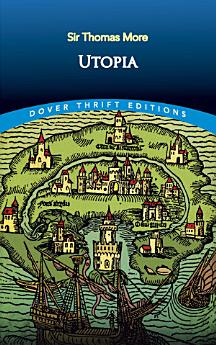关于此电子书
First published in Latin in 1516, Utopia was the work of Sir Thomas More (1477–1535), the brilliant humanist, scholar, and churchman executed by Henry VIII for his refusal to accept the king as the supreme head of the Church of England.
In this work, which gave its name to the whole genre of books and movements hypothesizing an ideal society, More envisioned a patriarchal island kingdom that practiced religious tolerance, in which everybody worked, no one has more than his fellows, all goods were community-owned, and violence, bloodshed, and vice nonexistent. Based to some extent on the writings of Plato and other earlier authors, Utopia nevertheless contained much that was original with More.
In the nearly 500 years since the book's publication, there have been many attempts at establishing "Utopias" both in theory and in practice. All of them, however, seem to embody ideas already present in More's classic treatise: optimistic faith in human nature, emphasis on the environment and proper education, nostalgia for a lost innocence, and other positive elements.
In this new, inexpensive edition, readers can study for themselves the essentials of More's utopian vision and how, although the ideal society he envisioned is still unrealized, at least some of his proposals have come to pass in today's world.
In this work, which gave its name to the whole genre of books and movements hypothesizing an ideal society, More envisioned a patriarchal island kingdom that practiced religious tolerance, in which everybody worked, no one has more than his fellows, all goods were community-owned, and violence, bloodshed, and vice nonexistent. Based to some extent on the writings of Plato and other earlier authors, Utopia nevertheless contained much that was original with More.
In the nearly 500 years since the book's publication, there have been many attempts at establishing "Utopias" both in theory and in practice. All of them, however, seem to embody ideas already present in More's classic treatise: optimistic faith in human nature, emphasis on the environment and proper education, nostalgia for a lost innocence, and other positive elements.
In this new, inexpensive edition, readers can study for themselves the essentials of More's utopian vision and how, although the ideal society he envisioned is still unrealized, at least some of his proposals have come to pass in today's world.
评分和评价
3.0
2条评价
作者简介
Thomas Moore was born May 28, 1779, in Dublin. Moore entered Trinity College in 1794, even though he was Roman Catholic, on the college rolls he was listed as Protestant. Moore's friend and classmate Robert Emmet, was a member of the United Irishmen, a group dedicated to freeing Ireland from the English. Emmet's involvement in various rebellions and his subsequent execution, recur in Moore's work. Moore managed to stay in favor with the English, while writing in favour of Irish independence and produced some severely critical works about the treatment of the Irish peasants by their landlords. In 1799, Moore went to England to study law. He became a social success in London, due in part to his friendship with the earl of Moira. This led to the publication of the translated Odes of Anacreon, dedicated to the Prince of Wales. In 1803, Lord Moira's influence arranged a post for Moore in Bermuda, but he appointed a deputy soon after his arrival there, toured America and Canada, writing poetry all the way and returned to England to publish the work. Moore was a well-known singer, and his publisher suggested a book of Irish songs to the music of Sir John Stevenson. The Irish Ballads were a resounding success, and paid well for the next 25 years. Another successful field for Moore was political satire and his main target was his former patron, the Prince Regent. Moore became friends with Lord Byron and the two corresponded constantly. They played off of each other until Byron's death, where upon Moore became the executor of Byron's Memoirs. In 1835, Moore was granted a Civil List pension, which equaled £300 a year. He was also elected to the British Association for the Advancement of Science. In 1842, he received the Order of Merit from Frederick the Great of Prussia. Moore lapsed into senile dementia in in 1849 and died a few years later on February 25, 1852.
为此电子书评分
欢迎向我们提供反馈意见。
如何阅读
智能手机和平板电脑
笔记本电脑和台式机
您可以使用计算机的网络浏览器聆听您在 Google Play 购买的有声读物。
电子阅读器和其他设备
如果要在 Kobo 电子阅读器等电子墨水屏设备上阅读,您需要下载一个文件,并将其传输到相应设备上。若要将文件传输到受支持的电子阅读器上,请按帮助中心内的详细说明操作。








